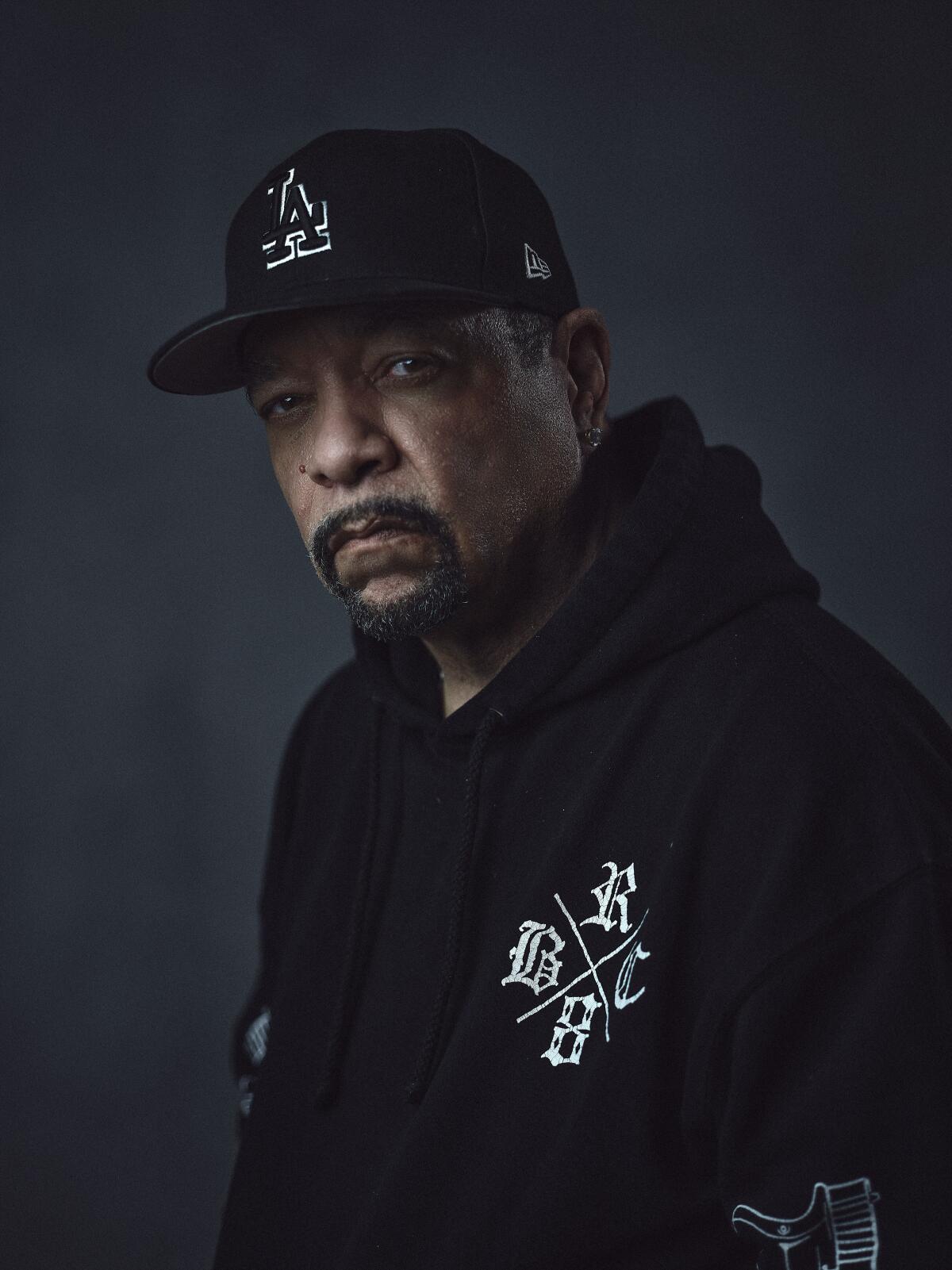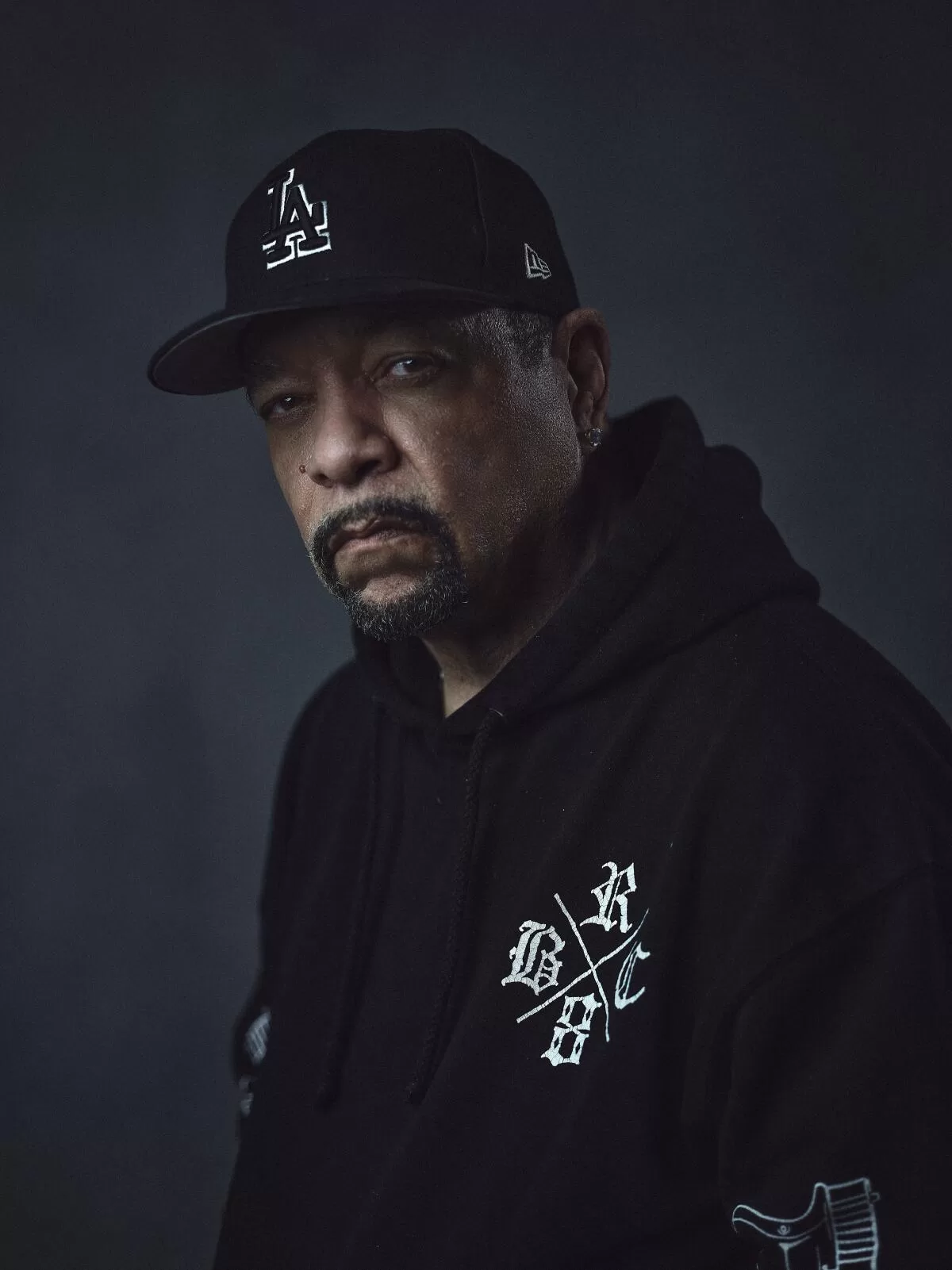“You don’t know me, fool / You disown me, cool,” Ice-T snarls in the 1988 hip-hop gang treatise “Colors.” The Afrika Islam-produced cut, the title track from the film of the same name, boosted the Jersey-born, then-L.A.-dweller out of the underground, kick-starting a multifaceted career that today finds Ice sitting on a curved couch in the bright open kitchen/family room of his Edgewater, N.J., home, daughter Chanel’s mostly pink toys carefully stacked nearby.
These days, fans of his music are used to seeing the rapper-turned-actor in mainstream commercials that would’ve been too scared to cast him back in the day. O.G. Ice-T wouldn’t have been caught dead shilling for Cheerios (Ice teaches yoga); Tide (Ice “cold calls” chef Gordon Ramsay); or GEICO (Ice at a lemonade stand). But if the leap from gangster to gladhander wasn’t part of a master plan, it’s not a far stretch.
“First, people don’t know who you are,” he explains of his early career. “The neighborhood knows, but the people don’t. So you got to make them understand that you’re a serious person. Before we can have fun, you have to understand that I’m not all fun, right? So now people meet me. They go, ‘you’re nice.’ I’m like, ‘Well, you’re not my enemy. There’s another Ice. You don’t want to meet him.’ ”
Today’s Ice-T — in the month prior to the U.S. election and before the death of one-time collaborator Quincy Jones — speaks eloquently on both those subjects. As well as on his Harley-Davidson-riding father-in-law, meeting Presidents Clinton (“That motherf— was charming as f—”) and Trump (pre-first presidency, “his character alone is piece of s— to me”), and the Constitution, before joyfully breaking into the chorus of the New Radicals song he hopes to cover, “we only get what we give.”
It’s a day off from the 66-year-old’s role as NYPD detective/sergeant Odafin Tutuola on NBC’s “Law & Order: Special Victims Unit,” a role he’s played for 24 years. The irony of the “Cop Killer” — the song by his heavy metal band Body Count that resulted in a parting of ways with Warner Bros. Records — playing a cop on TV is lost on no one.
“It’s like they think it’s a snuff record something. Like they really believed I was telling people to go kill cops, which I wasn’t,” Ice-T says, not for the first time since the track’s 1992 release. “I was acting a character out. But f— it, I call that a badge of honor. Like the new ‘Merciless’ album cover, Japan says they don’t want it.” (The band logo is in blue and red; giving both Crips and Bloods and Democratic and Republican connotations; Ice is in a blue surgical cap, blood-covered and holding a bone saw in front of a blond man in a Ku Klux Klan robe tied to a chair.)
The 12-track record is Body Count’s eighth album, with Ice and Crenshaw high school pal guitarist Ernie C (Cunnigan) and turntablist/keyboard player Sean E Sean its original members. Bassist Vincent Price, drummer Ill Will and rhythm guitarist Juan of the Dead round out the lineup with Ice’s son, Little Ice, his middle child, the band’s hype man and backing vocalist since 2016.
“Merciless,” like its predecessors, is full of sound and fury, signifying much that Ice finds wrong with the world, his evenhanded, intelligent opinions writ loudly, if graphically. The record was influenced by the COVID pandemic, but not in the way one might imagine.
“The whole ‘Merciless’ album is based on my love of horror movies. The last four albums have been the rebirth of Body Count with Will Putney producing. We went from ‘Manslaughter’ to ‘Blood Lust’ to ‘Carnivore,’ ” Ice says. “So this is ‘Merciless,’ this is all the saga. When ‘Carnivore’ hit last year, we did well, we won the Grammy. Everything’s hot. The label goes, ‘OK, give me another album.’ ”

Ice’s voice rises. “We just s— an album out!’ I’m like, ‘How the f— imma do another?’ We never got to perform because the album dropped the day COVID hit.” Ice, who takes riffs and songs written by his band and rearranges them to his liking before coming up with lyrics, adds, “People don’t understand that when you make a record, you might put on 12,13, songs, but you made 27 that didn’t make it because they weren’t good enough. You don’t want to use them for the next album. You have to start from scratch.”
With a shuttered New York City across the Hudson River, Ice, wife Coco (née Austin) and daughter Chanel spent COVID lockdown in Jersey. “I was watching horror movies, serial killers, all this s—. So before you know it, there’s a song called ‘The Purge.’ There’s a song called ‘Psychopath.’ I’m looking at this new election coming. I’m like, ‘these motherf—s are gang banging.’ All these different topics are coming to my head, and we make the next record.”
While both metal and hip-hop audiences are quick to call out posers, Ice-T comes by his rock ‘n’ roll bona fides thanks to his teens in L.A., the city he moved to after both his parents passed away. “I had a cousin when I lived in L.A. who thought he was Jimi Hendrix and would keep the radio on KMET and KLOS. I heard everything from Pink Floyd to J. Geils Band to Boston to ELO to Mott the Hoople to Edgar Winter,” he recalls. “I started to get into groups like Blue Oyster Cult, Deep Purple and of course, Sabbath. I started to like the darker stuff, right?”
While there remains precious few Black rock and metal bands, Ice-T says the initial goal with Body Count was “to find an audience to play for so Ernie could play his guitar.” Ernie C and late drummer Beatmaster V began pro careers on Ice-T’s 1987 debut studio album for Sire, “Rhyme Pays.” “We used the Sabbath hook from ‘War Pigs,’ but it was live drums, Beatmaster V. Then I did “The Girl Tried to Kill Me” (1989). Ernie played on that.” At the time, hip-hop was very sample-based. But a creative spark was lighted when Ice-T went on tour with Public Enemy. He saw “kids moshing off of ‘Bring the Noise’ and ‘[Welcome to the] Terrordome.’

“I’m like, ‘We’re gonna take the punk sensibility of Suicidal [Tendencies],’ who already had a gangbanger look,” says Ice-T, excited at the memory. “I said, ‘We’re gonna take the speed of Slayer and the impending doom of Black Sabbath, mash that together, and I’m gonna sing about the same s— that I sing about in rap. But I’m not gonna rap it. Imma bark it. I call it ‘barking’ because I was listening to New York hardcore, like Madball and groups like that. They’re not singing. I can’t sing like Journey, but yeah, this vocal delivery isn’t out of my range.’ So I said, ‘Let’s go.’ ”
More than 30 years later, Body Count has not run out of heavy riffing ideas or equally weighty lyrical topics. The new song “Do or Die” isn’t from his horror movie binge; it’s the frontman’s view on guns. Ice-T isn’t necessarily pro-gun, rather, the former Army infantryman clarifies: “I walk into a room, and nobody’s got a gun, OK. But if I walk in the room and somebody’s got a gun, I want a gun. I don’t want to be the guy with the butter knife.”
Thanks to his common sense approach to life, people tell Ice-T he should be in politics. The one-time gangster’s retort? “I got out of crime. I’m on a soapbox. I can say whatever the f— I want. I’ve pretty much said everything I wanted to say. I think in my history, you can look at Ice-T and say, ‘Ice-T has done some crazy s—.’ But I doubt if you find something I done stupid.”
The father of three and husband of 22 years’ time denies having any secrets. “I never been to no Diddy parties; not my scene. Honestly, I come from so much drama and chaos that when I finally got a chance to get out of it… I don’t jaywalk in New York. I don’t break the law. I don’t do that,” he adds, “because I used to do it every day. I was deep in, and I could have caught a life sentence. I’ve been so blessed and so lucky. if I did anything illegal, if I lied to somebody, if I did something crazy, I think I’d die. I think I would suffer Instant Karma.”
Elder statesman Ice-T is also OK that he’s no longer speaking to the youth. “You have to embrace your evolution and understand that the torch has to be passed. Like Chuck D told me, ‘At this point, if you’re not having fun, you did all this for nothing.’ I think what we did,” he concludes, “was the heavy lifting. We did enough to change the world. To me, Barack Obama was a hip-hop president. He was the president of the kids who voted for him, that grew up with us. Those white kids didn’t exist before hip-hop, you know? We created a surge of young white youth who weren’t racist.”
And while he’s happy to “talk s—” to his longtime fans via “Merciless,” he says, “we did our part. It’s now time for young kids to do their part. We need a new young PE. A new young Ice-T. Because now, I’m sorry, but I’m the old guy.” He’s glad to still hold — and step over — the line, while understanding he’s not influencing young people “the way a 21-year-old or youngster would if he was saying it. It hits them harder because it’s their peers.”
That’s not to say a Body Count show is anything short of raucous or provocative, Ice-T bringing the noise and intensity with his equally pumped high school OGs in the band. “When I play a song, the audience goes back to the day they first heard that song. And then for me to perform it correctly, I have to go back to that moment when I wrote ‘Colors,’ ” he says. “So now I’m a 16-year-old dude on a stage, gangbanging, because to perform it correctly, I have to get into that place. So music is the fountain of youth.”
